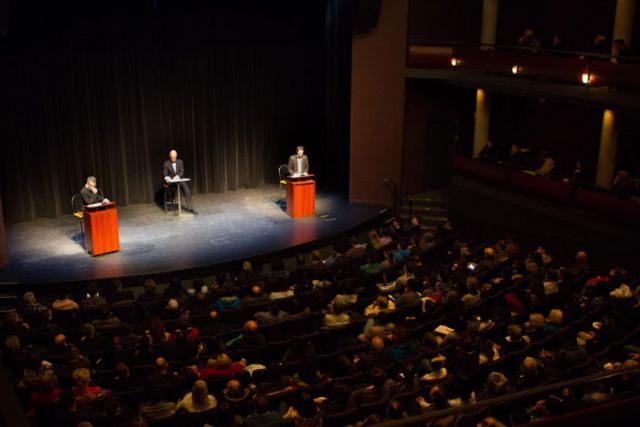Maybe it was unavoidable. The debate, which was phenomenally well-organized and attracted 500 souls on a frigid February Friday night, centred on the mystery of God’s existence, not on the miraculous persistence of G.K. Chesterton’s influence nearly 78 years after his death.
Certainly the two debaters gave their best. Fr. Philip Cleevely, an Oratorian priest at St. Philip Neri in Toronto, showed his polish as an Oxbridge trained philosopher-theologian; inquiring skeptic Justin Trottier, founder of the Centre for Inquiry Canada, gave the improv version of a non-believer mystically enthralled by his own earnestly polite cleverness. Each came ready in his way for the rhetorical exchanges that sprawled over two-plus hours.
Fr. Cleevely evidently knows his Wittgenstein, whom he quoted in his opening salvo as if to shake the ground with the biggest shot first. Mr. Trottier, equally evidently, knows how to use Google alerts to keep abreast of the latest scientific advances. If he was, at times, exposed as almost cruelly out of his depth against Fr. Cleevely’s erudition and forensic craft, there was no embarrassment in it. Credit him as a scrapper who almost managed the appearance of pulling off one or two surprising shot.
After unloading with his Wittgenstein in the initial round, Fr. Cleevely chose to fight from behind his gloves. His strategy was essentially argument by attrition: While science can tell us the “what” and the “how” of existence, it can never tell us the “why.” What exists can know only that it exists, not why it has come into existence. Only an Other standing outside existence can answer why; what stands outside existence knowing the why of existence is God. Ahead on points at that point, he quite pointedly did not defend the Christian truth of God. The specific Christian truth of God, he said with veteran tactical shrewdness, was better left for a future debate once the general existence of God is accepted.
From my balcony perch, it seemed Mr. Trottier gusted from flummoxed to pole-axed by his opponent’s refusal to respond in the manner expected by a founder of the Centre for Inquiry Canada. In essence, he sought to have Fr. Cleevely meet the following test: “God cannot logically exist, therefore describe Him in a way that convinces me you are not wrong to believe in Him.” Not surprisingly for someone who spends time teaching philosophy to seminarians, Fr. Cleevely took a pass, leaving Mr. Trottier swinging at air and looking increasingly grim.
It was there that Chesterton seemed missing the most. Plainly put, there is either no room at a Chesterton Debate for seriousness that takes itself so seriously — or there is no room for Chesterton. It is certainly possible to argue about God in Chesterton’s name. He made his own journalistic and literary name largely doing just that. When his wife Frances chastised him for not writing about God often enough, he replied that he never wrote about anything else.
Yet even the country’s inquiring skeptics surely understand that for Chesterton, lover of all things medieval, the best joust was a joke. Against those who assert their convictions with the crabbed intensity of frontally attached Siamese twins playing tournament chess, Chesterton gave space to argument that had good nature and good humour at its heart.
The Chestertonian spirit enjoins debate, enjoys debate, but above all makes debate another opening for joy. Grimness in pursuit of rhetorical victory is as incongruent to Chesterton as a merciful God is to the blind, pitiless universe of an inquiring skeptic.
In fairness, the location more than the interlocutors might have been the problem. The debaters were isolated behind lecterns on the large stage, separated by a void more yawning than the gulf between their beliefs. They should have been seated side-by-side in ample pub chairs. Instead of drinking bottled water, they should have had a welcoming table supplied with substantial beer.
Chesterton, of course, loved beer. It was among the things that made him so abundant. He loved beer as he loved God: in the cause of good company and glad hearts. Let us pray that particular goodness of G.K.’s spirit fills the debating hall the next time round.
(Stockland is the Director of the Cardus Centre for Cultural Renewal in Montreal.)


